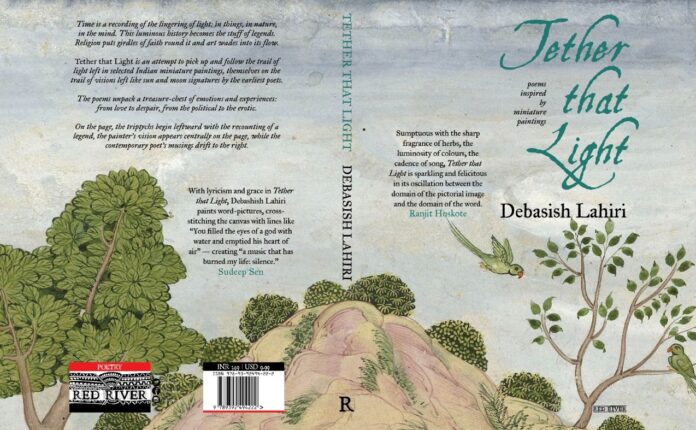Book Review by Anjana Basu
This poetry collection, in a sense, is a series of dramatic monologues delicately brushed in by Lahiri’s inimitable style. The introduction to the collection by eminent personalities well versed in both poetry and art – Ranjit Hoskote, Sudeep Sen and BN Goswamy poignantly talks about the way in which Lahiri has transmuted Indian miniatures of the medieval Mughal period from the brushwork of canvas to strokes on ink. The poet’s main subject is the work of the Mughal court painters, especially, a painter known as Nainsukh who, in old age, was half blind. The poet has also extended his imaginaive poetry to cover the painting that shows an Emperor’s son caged in a minaret looking out at the sea and those that have the Krishna Radha themes so beloved by court painters.
The collection belongs to the ekphrastic genre, which has come to stand for poems about art and poetry inspired by paintings/visuals. In his essay on the history of ekphrastic verse, Alfred Corn wrote “once the ambition of producing a complete and accurate description is put aside, a poem can provide new aspects for a work of visual art.”
In this suite of 41 poems in which the pictures/paintings and the poems complement each other, the poems show how cultural memory journeys from an ancient legendary past to the contemporary politically charged present, through the medium of Indian miniature paintings. The artefacts and the poems that surround them serve as evidence of a continuing tradition that permeates all facets of life, from the mundane to the extraordinary. Life and longing continue to be the inalienable features of life and broken hearts and separation remain ageless.
Colours speak to their artists – like indigo which calls Nainsukh his uncle. Indigo – the colour of forgotten evenings and the peacock’s dying song or the turquoise of the sea in Indian miniatures.
All the poems are linked by a consciousness of light and darkness – the bruise of night being pressed down to nothingness, or the disappearance of light. Lahiri has a plethora of metaphors, each as evocative as the other. There are meetings sited by rivers – the Ganga or unknown streams, since rivers are the great mirrors of light.
Light is lonely
in my studio today
it is also silent
no cuckoo
shall give respite
to that sea of blue deafness
In between there are stray moments of a girl escorting her lover home through dark streets perhaps in the time of Covid, perhaps not, though it would be a very open minded father who sends his daughter unescorted as Lord Nanda seemingly did and wonders why she is late.
The young girl
escorted
the young man
a matter of transverse sliding
across the mouths of quiet lanes
Horns compete with peacocks in another poem – a sudden touch of modernity creeping into the medieval Mughal world though fitting in so neatly that it seems to belong to the past rather than the present.
In the alcove of sequestered song
Around which a bare city howls
The cab that bears my love away
As mentioned by BN Goswamy in his foreword, Lahiri manages his verse like ‘the gentle flow of a river’ without dropping the effectiveness of his language and the subject.
Shall we change for each other
one afternoon, bend night into day
turn dusk upon dawn
in deserted Milan?
The layout and print quality of the book stand out very well and would definitely be a treat to the poetry lovers.
(About the book: Tether that Light – Debasish Lahiri – Red River Publishers – INR 349)
About the Poet

Debasish Lahiri is an Assistant Professor in English literature at Lal Baba College, affiliated to the University of Calcutta. His writings on Postcolonial theory, Indian, American, African & Australian Poetry, and European Modernism have been published in international journals and anthologies of criticism.
His poems have been widely published in journals like The Journal of the Poetry Society of India, Muse-India, Indian Literature, Inkapture, The Poetry Salzburg Review, Mediterranean Poetry, Weber: The Contemporary West, Six Seasons Review, Byword, The Punch Magazine and The French Literary Review among others; in French translation in Siècle 21, Europe, Recours au Poème & La Traductière; in Italian in NUOVI ARGOMENTI and in Portuguese in NERVO: Colectivo de Poesia.
His six books of poetry are: First Will & Testament (Writers Workshop, 2012), No Waiting like Departure (Authors Press, 2016) which was shortlisted as one of the five best collections of that year by Scroll & India Today, Tinder Tender: Poems of Love & Loitering (Authors Press, 2018), Poppies in the Post & Other Poems (Authors Press, 2020), Paysages sans Verbes (Edítions Apic, 2021) and Tether that Light (Red River, 2022).
About the Reviewer
Anjana Basu is a noted novelist, poet, reviewer and travel writer.
















